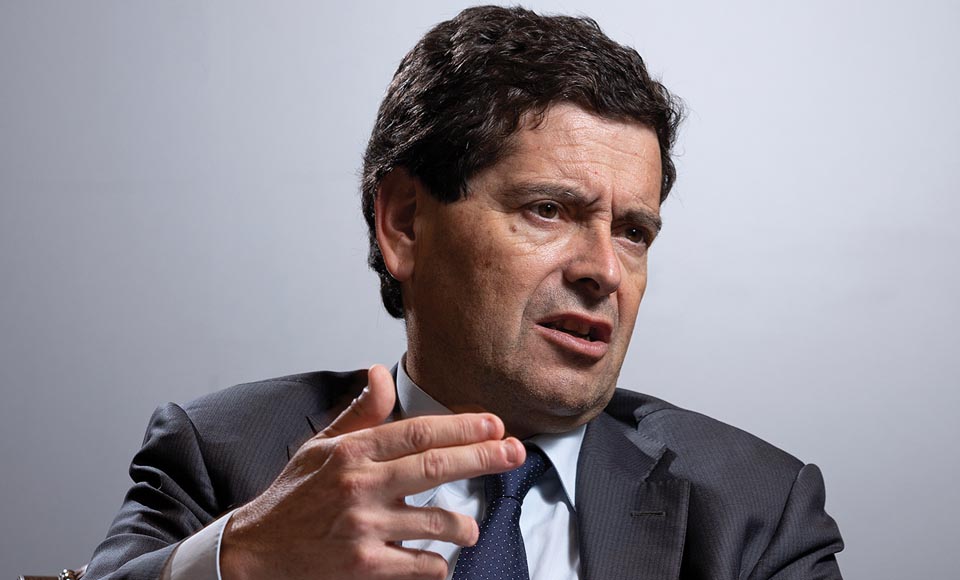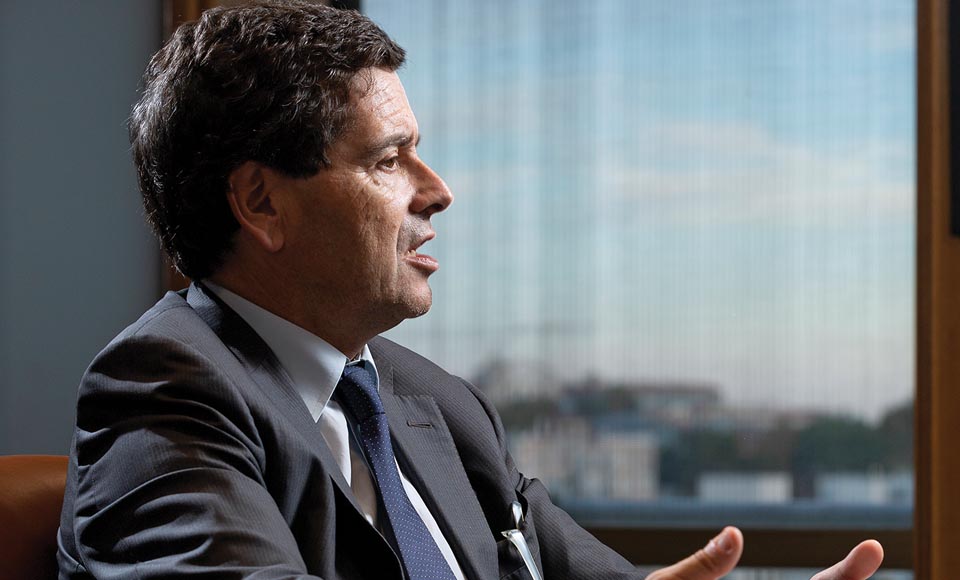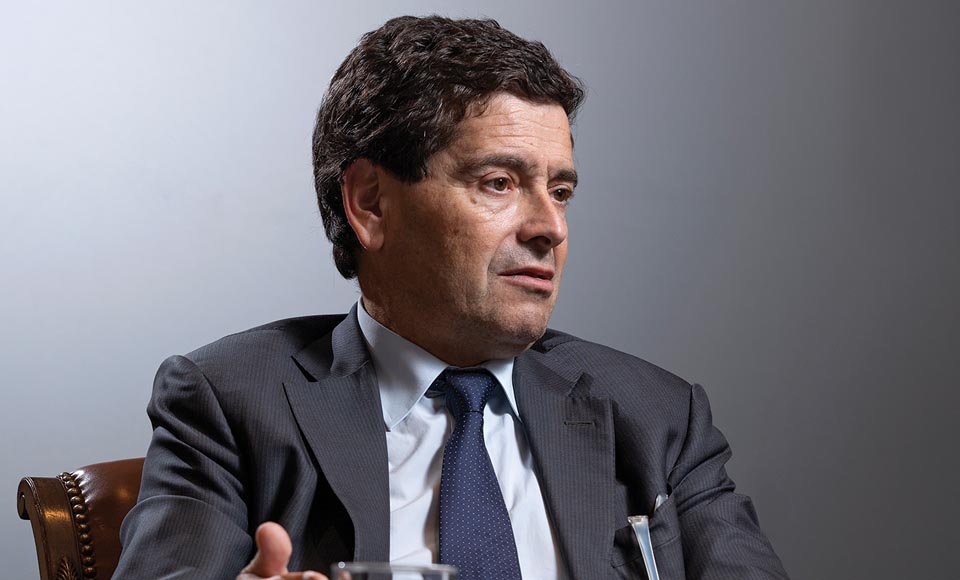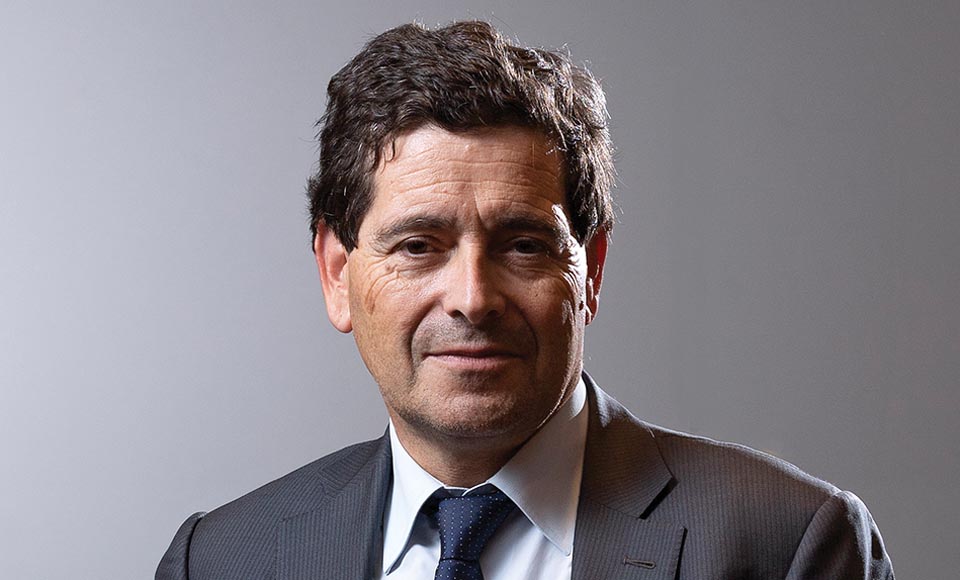Interview with António Ramalho, CEO Novo Banco
André Rito
Leading the destinies of Novo Banco, António Ramalho had the sale of the institution in his hands after various failed efforts. Between the collapse of BES and his arrival, some two years went by. In 2021, he presented the first positive results: a 137 million euro profit for the first quarter.
There was an internal bank project in recent months entitled 31 March. What did this deal with?
This was a project designed to achieve the objectives of the first quarter for this year and, simultaneously, the closure of the scrutiny made by different entities ongoing at Novo Banco. We had agreed the date with the European Commission (EC) for the end of restructuring on 31 December 2020 and this reflects the scrutiny taking place in the following three months made by auditors independent of the bank, the Ministry of Finance, international entities and the Parliamentary Commission of Inquiry. This was, therefore, a project to gather the information that we were targeting that would end at that time, 31 March.
Which ended up by not happening.
This all took place a little later even while from our perspective this was perceived as the closure of a cycle.
How was this process managed internally? Did this imply a major mobilisation of your teams?
Yes, this was a process with great mobilisation that was first a novelty and then became an ingrained routine that served mutual benefits. A novelty because financial institutions have major control mechanisms in a traditional format, through auditing, but they are also controlled by the regulator and supervisor. In this case, an international supervisor, the European Central Bank. A routine through the new audit procedures required by the Court of Audit. We were able to mobilise the teams to provide this information. Finally, mutual benefits because, at a certain time, the only way of explaining such a complex restructuring process was through very powerful scrutiny – and we were capable of, internally, explaining that these efforts would be worthwhile. This was what mobilised us.
This year, the bank turned in a positive 137 million result in the first quarter, having reduced the demands on the resolution fund. We are also towards the end of the Parliamentary Commission of Inquiry. Does the ending of this process represent a turning of the page in the bank?
We are at the point in time of providing an overview, not complete but that is beginning to take clearer shape. The question that we have to answer: was it worth it? This is the key question from our clients, our staff and all of our stakeholders. The institution has been through three cycles: the first, of resistance. This was the first institution that underwent resolution within a framework that was not even yet in effect in Europe, a difficult process that normally lasts 24 hours but that in our case took over three years with various rounds of negotiations with the European Commission. During this period, it was necessary to keep up staff morale, the trust of clients and the liquidity of the institution. Throughout restructuring, we sought to provide solutions to various of the bank’s difficulties: the extremely heavy legacy of poor quality loans, a very significant legacy of over-evaluated or poor quality properties – plots, former industrial facilities – and as well as long term and high levels of debt. This all made managing the bank extremely difficult. There was a need for state support, from a private shareholder that invested a billion euros as well as support from shareholders agreeing reductions in the debts owed. Our toxic assets then accounted for a third of our balance sheet. Such a level only otherwise existed in Greece.
What does this closure of the cycle represent?
The rebirth. Giving the bank its functions back again, supporting clients, the national economy, the necessary lines of credit, everything that is expected of a bank. With positive results in the first quarter of this year, we embarked on a new phase. We have to be successful in this rebirth.
You recently wrote an article in the Diário de Notícias newspaper saying “it was worthwhile”. Do you simultaneously feel a certain irony in your words? Were you expecting a different type of recognition?
The article was of its time and purpose when written at the beginning of August. It is in thanks to the words of Dr. Fernando Negrão, President of the Parliamentary Commission of Inquiry. After eight and a half hours of the commission sitting, tired, without any further questions for clarification, he asked me to thank the Novo Banco members of staff in a particular and real way. This referred to the enormous group of people who deserve recognition for having preserved the institution. I thought I should thank him for these words on behalf of our employees. This alone was worthwhile.

“RECOVERY IS NOT A TECHNICAL
SCIENCE AND IS PRACTICALLY
AN ART FORM BECAUSE WHEN
IT BECOMES VERY TECHNICAL,
THEN THIS TENDS TO BE BOTH
UNFAIR AND INEFFICIENT.”
However, did you not expect a different political opinion than that which predominates in public opinion?
I do not think managers need to hold any type of anxiety as regards the political judgements made of their companies. We should be evaluated by our deliveries: we had an agreement reached with the Portuguese government and the EC and I had to deliver on that commitment: there were 33 demands that were being made. And that is the greatest recognition that somebody might gain. Almost everybody thought this was impossible.
Nevertheless, the bank issued over 90,000 legal actions over the recovery of bad debt.
Recovery is not a technical science and is practically an art form because when it becomes very technical, then this tends to be both unfair and inefficient. If my model of recovery was to launch judicial actions, I would be handing over my function to the courts. First and foremost, this requires an evaluation of the best way to recover, the courage for strategic defence, a notion of the difficulties of these cases and within the enormous tension existing between clients and banks during this period. 90,000 cases may seem a lot but we should recall that we handle over 500,000 cheques per day, we do many more from the point of view of bank card transactions. This relational pathology with the client represents only a small proportion of our banking activities. There were business owners who made incredible efforts to get back into the market, reducing their debt levels and the majority of these clients achieved this. This pathological part provides a lot of headlines for the newspapers but is not the most emotional part of banking.
Which is?
That is knowing that, today, 99% of clients comply with their responsibilities and continue to deserve the support of the bank. These are the clients that make a bank. The others are an issue we have to deal with. Some do still deserve our support, others have shown more critical behaviours. But we are not here to criticise, we are here to recover.

“THIS IS A QUESTION OF
ESTABLISHING AND MANAGING
PRIORITIES. IN THE PANDEMIC,
THE BANK ENCOUNTERED A GREAT
TEST OF ITS UTILITY TO PORTUGUESE SOCIETY.”
How was managing the problems of the bank due the pandemic, with the layoff and credit moratoriums that are now coming to a close?
This is a question of establishing and managing priorities. In the pandemic, the bank encountered a great test of its utility to Portuguese society. For two reasons: in 2020, we were a bank under restructuring and we had to display the courage to provide a response to the pandemic and continue with our recovery. We focused on three fundamental lines of action: credit concession lines – via the state guaranteed lines -, we were the first bank to apply the initial 400 million line, and we were also a very active bank in granting the guaranteed lines of credit. We were among the major banks for company moratoriums: only two banks reached over 4 billion in company moratoriums and we are one of them that demonstrates how we assume our role as a Portuguese bank. The bank is also the actor for lay off payments and was the only entity responsible for processing these layoffs in cases where it was essential to guarantee and maintain employment.
What was your role during the most difficult period of the pandemic?
The pandemic implied a great deal of effort from my teams. We had people working continuously. I never stopped coming to the bank every day not out of need but because it was impossible not to come when my entire commercial department was responding to client needs. As regards health, we had zero fatalities even while a percentage of staff had Covid. The bank did not stop and developed projects in keeping with such a complicated period beyond our normal activities. We launched a meal ‘market place’ in various small cities where the bank’s clients could order meals paid for by account debits. This served our clients and, even if not a banking function, with a great deal of utility to the people. The Portuguese banking system carried itself extremely well very greatly due to the experience of crises and always inspired on our capacity for improvisation.
Nevertheless, we are still going through a crisis with impacts that we are not yet able to accurately measure. What perspectives do you hold for the future of the Portuguese economy?
We have to separate the short and medium terms. The first stage is the end of the moratoriums and for this we have good news: clients are able to adapt and we are in a context of low interest rates and two years in the life of a mortgage loan, for example, is broadly irrelevant. Few credits will have to be restructured. As regards this, we are not expecting any effects on society. Some sectors and people will be more affected but we are positive as regards private clients. For companies, there is the consequence of a global crisis with asymmetric effects that require us to display some caution in the restructuring of these businesses. Our companies have demonstrated significant resilience and a great capacity for adaptation. I would say we may be reasonably optimistic as regards getting out the crisis. We will have the forecasts upgraded. As regards the medium term, we have to be more careful as there are effects with conclusions we are unable to reach: the changes in consumption habits and patterns, the type of work, mobility. What existed before the crisis may not be returning. I don’t know whether there shall be fewer ties and more sneakers, fewer shopping centres. Furthermore, there was an alteration in the supply chain of value due to the rise in raw material costs. I am optimistic for the short term and cautious over the medium term.
Changing the subject; you studied Law at Católica University, a jurist but never a practicing lawyer. Why that degree? What were you thinking at the time?
I am the son of a financier and a mathematician that only contradicts still further my choice of degree [laughter]. But I’m also the child of the Marcelist spring and the 25 April revolution, which means I’m a child of all those anxieties and perspectives. When we are very well financially and mathematically prepared – and we want to change the world -, I believe that law provides the mathematical abstraction closest to changing the world through a normative approach. That was how studying law appeared in my life. After graduating, I ended up doing a Master’s Degree in the International Juridical-Commercial Sciences and then I went to Oxford. All of my life has been connected to public finance. I was the financial director of Banco Pinto e Sotto Mayor: managing technically from the financial point of view. I was a trainer, a specialist in the capital markets.
Did you note any major change in financing and banking?
I’m already a dinosaur, there’s no doubt there. Yes, I have. At the time, all banks were state owned, emerging from a difficult period, and I witnessed the first wave of privatisations and the consolidation of the financial system that followed its privatisation. And there are immense parallelisms with contemporary times. I was in Banco Pinto e Sotto Mayor when I witnessed the failure of the first privatisation, having been successful at a later date in a second privatisation process. I ended up coming to Novo Banco, with the first sale also not going successfully, we needed the support of the state and the second sale was a success. We feel we are able to serve the national economy.

“THE REBIRTH HAS A DEADLINE
AND A DATE. WE AIM TO
CREATE AND BUILD A
STRONG BANK BY 2024.”
How did you perceive the fall of BES? And in this context how did you decide to accept the role of Novo Banco CEO?
When the Governor of the Bank of Portugal understood that my experience might be useful, I thought it might be worthwhile to set up a team to develop a solution for Novo Banco, which was daily going through difficult periods for motivation. I recall in my first meeting, I only said “I have come to stay”. My commitment was to take over the helm and steer through to calmer waters.
You give the sensation of being at the end of a cycle. What do you see in your future?
The rebirth has a deadline and a date. We aim to create and build a strong bank by 2024, based on a new way of working that is already represented in our new headquarters in Tagus Park and with a new and rejuvenated image. We have a new strategic plan to deliver results, solidity and meeting our fundamental values: our Portuguese identity, our professionalism, proximity to clients. Naturally, this is my next future. I’m one of those who perceive the long term as a succession of short terms.







